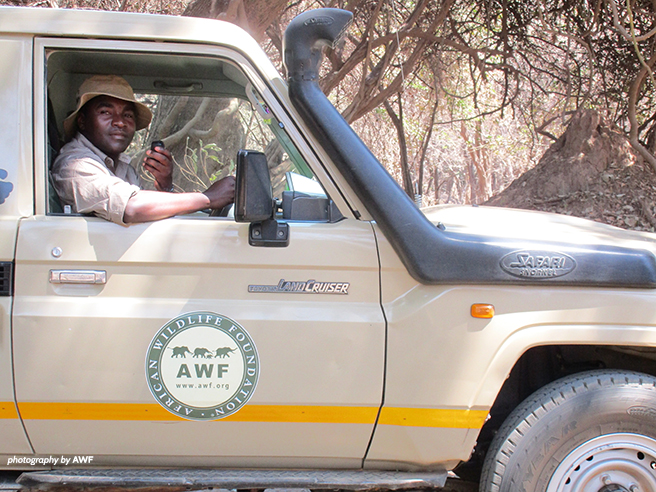Inside AWF: A Q&A with Simon Muchatibaya

In August, Simon Muchatibaya joined AWF as the Technical Advisor in Zimbabwe’s Mana Pools National Park. Muchatibaya’s role is the result of a partnership between AWF and the Zimbabwe Parks and Wildlife Management Authority, demonstrating both parties’ commitment to protecting a World Heritage Site that has been subject to intense poaching. AWF’s Communications staff sat down with Muchatibaya to learn more about his life growing up in Zimbabwe and his extensive conservation background; you can read the conversation below.
When you were a child did you have any heroes or role models that you really looked up to?
I had quite a number of role models growing up, but there was one guy who used to be a Sergeant in what is now the National Parks Authority. His name is Madekwana Shoko, and he inspired me a lot.
He was a very strong conservationist—whenever he spoke to people or whatever he did for them he did with conservation in heart. So I think these are the footsteps which I am just following.
Has becoming a conservationist always been your dream?
Yes, I started falling in love with nature at a very young age. Some of my family members, my brothers in the rural areas of Zimbabwe, at a very tender age they took part in the illegal killing of small animals in the field, but my parents always told me that I never did that. Up until now I never illegally killed any animal. Therefore, I was a conservationist from the get go.
How did you start your career with the National Parks and Wildlife Management Authority?
My dream was to be in conservation, so when the opportunity came I just grabbed it. I went for the interviews and screening, and I managed to come out on top; that was back in 1999. I was what we called a scout II, and my responsibilities were to carry out anti-poaching patrols and report back on what I encountered in the field.
Looking back at your career, what moments have made you the proudest?
I can confidently say with a very loud voice that no matter the task I have been given, since I joined the Parks I have managed to bring back results. I have been assigned to one park after another, and even in the face of tremendous obstacles, and with little resources, I would still bring back results—I am very proud of that.
What do you think most contributed to your success with your anti-poaching efforts?
It has definitely been challenging work, but with commitment I managed to get these results. I think commitment is from the heart and the mind, and it also depends on what takes you to the job you are doing. If you are there because of money, your commitment will be very limited. But if you are doing the task with all your heart it will be very different.
To me, conservation is like a calling—even if the situations are not favorable, even if the resources are scarce, I will have the commitment to keep on going and aiming for better results.
Tell us more about your new position with AWF. What do you think of it?
My recent appointment to AWF is a turning point for me. Now that I am in AWF running a project, my responsibilities are much larger than they had been in the past.
As we all know, in most parts of Zimbabwe (and Africa more generally) poaching is on the rampage. My role is to come up with and implement the strategies to reduce the poaching problem in the Mana Pools area—to ensure the old Mana Pools that we used to know in the Zambezi Valley comes back.
We used to have black and white rhinos in Mana Pools, and a lot of visitors used to love seeing these animals. Now they are no longer there, so what I am aiming to do with AWF is to make sure that we protect the natural resources and reduce the poaching instances so that the authorities in Zimbabwe will become confident in us and even ask us to re-introduce these two species in Mana Pools.
If a young person asked you to describe most important thing for living a good life, what would you say?
The fundamentals for living a good life are to be hardworking and to be honest with yourself. Be honest with your friends, your family and your workmates. Be a hard worker; work for yourself and for your life.
